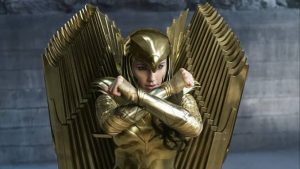Luca‘s greatest misfortune, I fear, will be its timing. Pixar’s critically-acclaimed, Academy Award-winning, almost universally beloved maybe masterpiece Soul was always going to be a tough act to follow, especially when audiences hold Pixar films to such a abnormally high standard that anything less than “perfect” is seen as an abject failure, and a Pixar entry’s worth is apparently based on how many tears it can force out of you. And preceding Disney Animation’s Encanto by a sizable distance into the race for Best Animated Feature at next year’s Oscars was always going to be difficult to justify, in a race where the strongest competitors enter nearer the finish line.

Luca therefore finds itself in a situation much like last year’s Onward, and the similarities don’t end there. Luca too will suffer from a botched release that is sure to damage the film’s profitability and franchise potential – but whereas Onward enjoyed a few days in theaters before the entire world went into lockdown in March 2020, Luca is a Disney+ exclusive: and like Soul, it’s completely free for anyone with a subscription to the service. This has understandably caused some tension between Disney and Pixar, which is essentially being asked to survive on awards recognition for the time being – awards recognition that, as previously mentioned, they’re having to battle their own corporate overlords to achieve.
And unfortunately, Luca is excellent – but not in the way hardcore Pixar devotees consider the studio’s “best” films to be excellent. In other words, it’s not making enough people bawl their eyes out or reconsider their entire perception of the cosmos and their place therein, therefore it must be an unsightly blemish on the studio’s spotless reputation, which will be just fine, I promise you: Pixar survived The Good Dinosaur, and Cars 3, and Ratatouille (oops, did I say that out loud?). Instead, Luca is a summertime comfort film that is bigger at heart than in scope, with colorful landscapes more sweeping than its sweet message, likely to produce more laughter than tears – although I’m gonna be honest, you’re heartless if your eyes don’t at least well up a little bit at the final scene.
And there’d be no shame in full-on crying, because Luca is far more raw and emotional than most critics have cared to warn you. On the surface, sure, it’s just a story about two young sea monsters, named Luca (voiced by Jacob Tremblay) and Alberto (voiced by Jack Dylan Grazer), who leave the water and journey on land through the Italian Riviera, finding themselves in a cheerful seaside town named Portorosso – a town which just so happens to have a long and storied history of hunting and killing sea monsters. But the film uses its peculiar premise as an opportunity to explore some truly beautiful themes of friendship, specifically the importance of surrounding yourself with people who accept you for who you are, and who understand what isn’t within their rights to try and alter about you.
All of which is to say, the queer-coding is strong with this one. Director Enrico Casarosa has claimed that the film is necessarily set in a “pre-puberty world” and that no romance enters the equation as a result, but Luca and Alberto’s dynamic doesn’t have to be interpreted as romantic for a queer reading to be applicable. Luca’s journey on its own is already representative of many LGBTQIA+ experiences (minus the shapeshifting sea-monster part): from being found out by his overprotective, close-minded parents, who threaten to send him off with an even more conservative relative for some kind of moralistic reeducation, and running away from home as a result, to finding healing and validation with someone like Alberto, whose street-savvy makes him a kind of Mentor In Queerness archetype in this reading.

I also appreciated that Luca‘s queer-coded sea monsters aren’t fearsome beasts. Using inhuman creatures of any kind as a stand-in for marginalized communities who are often met with accusations of being less than human is always a balancing act to some degree, but Luca is leaps and bounds above, say, Zootopia. Crucially, Luca‘s sea monsters aren’t innately dangerous (in fact, they’re downright pacifistic, based on the rural life they lead under the Mediterranean), and with their vibrant colors and wavy, luminous hair, they’re more entrancing than monstrous…well, except for Uncle Ugo (voiced by Sacha Baron-Cohen), an anglerfish/sea monster hybrid from the depths of the ocean, who doesn’t respond well to the pressure change near the surface.
But, perhaps in an effort to avoid comparisons to Finding Nemo, Luca spends significantly more time on land than underwater – and the film’s animators and artists, working mostly from their homes during the pandemic, clearly focused their efforts on enriching the tranquil environment of Portorosso, its people, and its culture. I have to admit, their efforts were not entirely successful: the Italian landscapes are beautiful, and I was left in awe of some of the most impressively realistic lighting I’ve ever seen in animation, but the setting feels like it was chosen for the lavish backdrops it could offer the simplistic story, rather than to enhance the story’s themes, and I never felt – as I did watching Coco – that the two intertwined as cohesively as they could have, or that we were allowed a glimpse of the Riviera’s cultural identity that amounted to anything more than a microcosm of Italy in general.
Also, as a Eurovision fan, I feel legally obligated to note that Pixar missed an opportunity to incorporate Italy’s Eurovision-winning band Måneskin onto this film’s soundtrack somehow. I wish I was sorry about derailing an otherwise normal film review like that, but I’m not.
But leaving that aside (if I must), the film commits few errors glaring enough to warrant the criticism it’s received from some folks who expect every Pixar film to be a paradigm-altering piece of modern art. Comfort is important too, especially what with everything going on in the world: and Luca feels like it understands that, and is offering audiences in 2021 exactly what we all need – the “Trenette al Pesto for the soul” that I referenced in the title (and no, I didn’t just hop online and pick a random Italian pasta dish: they actually eat Trenette al Pesto in the movie, and it’s a dinner scene worthy of Studio Ghibli).

So I genuinely hope Luca finds its audience on Disney+, and that it gets at least some of the recognition it deserves when awards season rolls around. But even if it doesn’t, it left me feeling warm and cozy and deeply satisfied, like good Italian food, and I’m thankful for that.
Rating: 9/10






